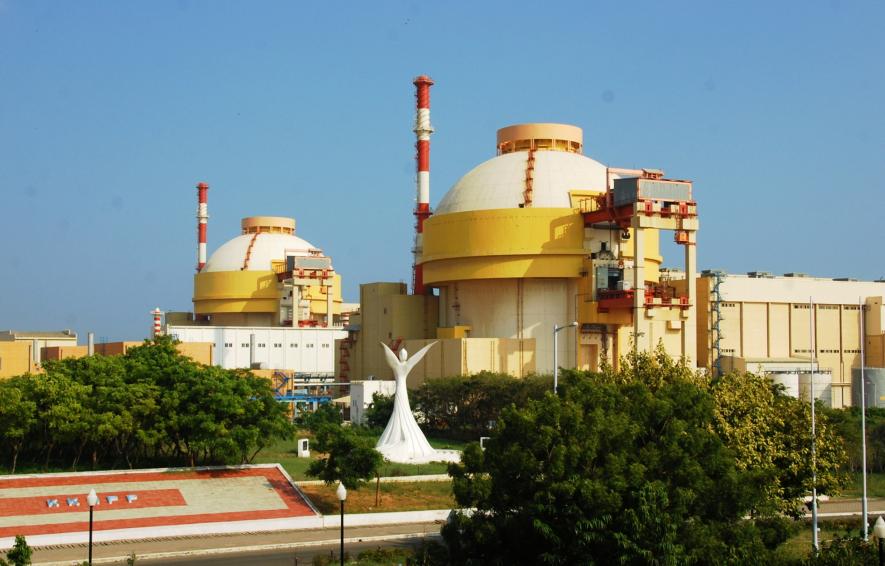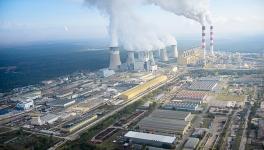TN: Expansion and Proposed AFR Facility in Koodankulam Nuclear Power Plant Spark Debate

The decision to increase the number of reactors in the Koodankulam Nuclear Power Plant (KKNPP) campus and the proposed away from reactor (AFR) facility hav sparked another debate in Tamil Nadu.
With two more reactors announced, the total number of units in the KKNPP campus has been increased to six with a 1000 MW capacity each. The tender notification of the Nuclear Power Corporation of India Limited (NPCIL) inviting bidders for the construction of AFR has further escalated the opposition.
While environmentalists flag safety issues associated with the nuclear power plants (NPP), spent fuel with radioactive elements and fear of natural calamities to oppose the project, science movements point to lack of transparency in the sector for the increase in apprehension.
Considering the low quantity of radioactive waste generated from the NPPs, the Union government has postponed the construction of the Deep Geological Repository (DGR) for another three decades, and the AFR has become a necessity.
‘AFR AGAINST PROMISE IN THE SUPREME COURT’
The NPCIL, in December 2021, invited bids to construct a spent fuel storage facility (SFSS) for units 3 and 4 of the KKNPP campus in the Tirunelveli district. In a letter to the Prime Minister, the Chief Minister of Tamil Nadu said that the decision to permanently store the ‘spent nuclear fuel’ (SNF) in the AFR was taken without consultation with the state government.
Poovulagin Nanbargal, an environmental organisation fighting against the NPPs, has demanded scrapping the plans to establish AFR in the KKNPP campus. The public hearing scheduled in 2019 for the construction of AFR for units 1 and 2 was cancelled after public outrage and opposition from political parties.
In a statement published by the Poovulagin Nanbargal, the organisation claimed that the Union government had violated its promise on the construction of DGR made in the Supreme court. The apex court had dismissed the plea of People’s Movement Against Nuclear Energy (PMANE) in 2013, which questioned the safety of the KKNPP.
In the judgement, the court noticed, “DGR had to be set up at the earliest so that SNF could be transported from the nuclear plant to DGR. NPCIL says the same would be done within a period of five years. Effective steps should be taken by the Union of India, NPCIL, AERB, AEC, DAE etc., to have a permanent DGR at the earliest so that apprehension voiced by the people of keeping the NSF at the site of Kudankulam NPP could be dispelled.”
In 2012, the Union government expressed the possibilities of exploring the process to establish DGR in the country. But, in a reply in the Parliament recently, the Union government has ruled out the immediate need for DGR, citing low radioactive waste.
The Poovulagin Nanbargal has demanded the state government withdraw the ‘consent to establish’ issued by the Tamil Nadu Pollution Control Board (TNPCB) for units 3 and 4 of the KKNPP.
‘NO LESSONS LEARNT’
Though the science movement in Tamil Nadu has opposed multiple units in a single campus, it has rejected the calls to shutdown NPPs. Speaking to NewsClick, PK Rajan, an energy expert and activist of Tamil Nadu Science Forum (TNSF), said that NPPs are required to meet the increasing energy demands of the state.
“India needs to add around 28,000 MW every year, and Tamil Nadu needs to install 2,000 MW every year to meet the demands. Energy is essential to ensure sustained development and generate employment. We cannot rule out atomic energy generation, though it comes with risks and problems,” he said.
In his speech at the COP26 conference held in November 2021, PM Narendra Modi committed to ensuring zero carbon emissions by 2070.
“We cannot cut carbon emissions immediately but have to move towards zero-emission considering the global warming threats. There is a need to shift to other forms of sustainable energy generation considering the massive population associated with thermal power plants,” Rajan said.
Multiple political parties have opposed the idea of having multiple units in a single campus, considering the tragic accident which happened in Fukushima.
“An expert committee formed by the Japanese Parliament after the accident has recommended not to have more than two units in a single campus to avert mishaps. The committee has also exposed the wilful negligence and lack of safety measures in the plants. These are lessons India must also learn,” Rajan added.
‘REGULATION AND TRANSPARENCY ESSENTIAL’
The lack of transparency and autonomy is plaguing the atomic energy sector in the country. India was a part of the ‘Convention of Nuclear Safety’, held in Vienna during June 1994, convened by the International Atomic Energy Agency (IAEA).
In the convention of nuclear safety, article seven was dedicated to ‘Legislative and Regulatory Framework’, and article eight was titled ‘Regulatory Body’.
“These two sections have spoken about ensuring a transparent, independent and constitutionally empowered regulatory body with adequate authority, competence and financial and human resources. Despite being a party in the convention, India has not ensured any autonomy to the AERB,” Rajan said.
The AERB had held inspections in units 1 and 2 of the KKNPP in the aftermath of the Fukushima accident and gave 17 safety measures through abundant caution.
The expert committee studied factors like external events concerning the safety of NPPs, the safety of electrical, control and instrumentation systems against external events, the safety of NPPs under prolonged station blackout (SBO) and loss of ultimate heat sink, the safety of spent fuel storage facilities at NPPs against external events, severe accident management provisions and guidelines (SAMG).
The PMANE in the case filed in 2013 said that the AEC had not fulfilled five of the 17 important cautious recommendations.
“The people are caught between the propaganda against nuclear energy and lack of transparency from the government of India. They have little to choose with literally very little information available in the public domain. To allay fears and unmindful propaganda, an effective and efficient regulatory body is essential,” Rajan said.
Get the latest reports & analysis with people's perspective on Protests, movements & deep analytical videos, discussions of the current affairs in your Telegram app. Subscribe to NewsClick's Telegram channel & get Real-Time updates on stories, as they get published on our website.























